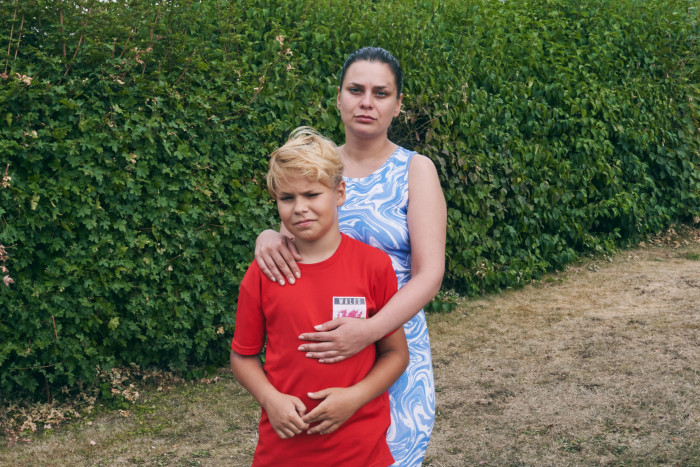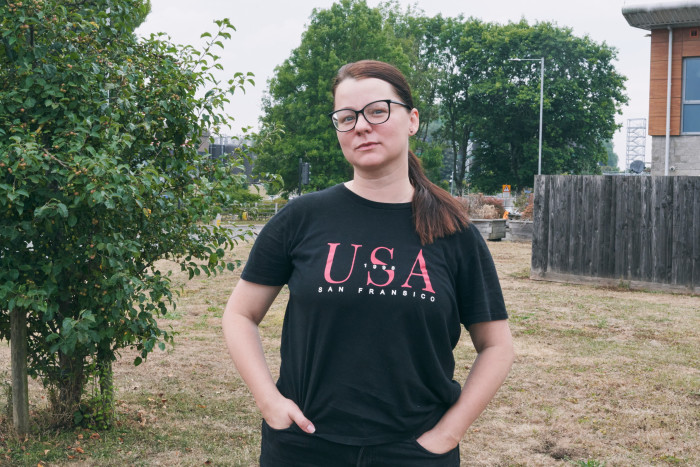For a group of 250 Ukrainians marooned at a motorway hotel in Wales, life under the Homes for Ukraine scheme — so welcoming at first — has been turning sour.
The Welsh government had originally promised the families they would be rehoused within weeks. Instead, they have been stranded, in some cases, for more than four months. Eating the same sandwich suppers, anxious about how their children will be schooled and with no near-term prospect of moving on, their hopes are fading.
“It’s like we have been thrown away in the wilderness,” said Ibrahim Dally, a 25-year-old dentist originally from Lebanon, but who studied, married, and settled in Ukraine before fleeing the Russian invasion.
Five months after the government in Westminster devised the Homes for Ukraine scheme as a response to the gravest refugee crisis in Europe since the second world war, trouble is looming for many who have arrived in Britain via this route. A crisis is also in the making for cash-strapped councils responsible for their welfare.
The scheme, which was beset by bureaucratic snags at the outset but has proved a success in many instances, allows sanctuary to Ukrainian refugees provided they have a sponsor willing to host them for at least six months.
As of this week, 127,300 visas have been issued this way, with a further 49,700 granted under a different route for those with UK resident family members.

But with no end in sight to the war, problems are emerging across the board.
About a quarter of volunteer hosts have said they will not extend their welcome beyond the original six months agreed, according to a survey published by the Office for National Statistics last week. Less than a quarter would go beyond a year.
This raises the prospect that tens of thousands of Ukrainians will be looking to local authorities to provide housing for them in coming months.
“Councils, sponsors and Ukrainian guests all need to know what the options are at the end of the six-month initial placement period, so they can start planning now,” said James Jamieson, chair of the Local Government Association, which represents more than 350 councils across England and Wales.
“There is a significant risk that . . . many families may need to present as homeless because of a lack of sponsors or other options,” he added.
In an attempt to forestall that outcome, Lord Richard Harrington, refugees minister, said this week he was in talks with the Treasury about doubling the monthly payments made to hosts from £350 to £700 — for those who agree to extend their welcome beyond six months.
The opposition Labour party have stressed the need to reduce the burden on sponsors. Lisa Nandy MP, shadow levelling up secretary, said on Tuesday: “If the government do not act now, they will risk a huge number of Ukrainian refugees becoming homeless this winter.”
About 4,000-5,000 Ukrainians are arriving in the UK each week, Harrington told the Financial Times, who said he was working with non-profit groups to find new hosts, as well as contacting those who had registered an interest in becoming sponsors.
Meanwhile, a separate crisis is brewing in Scotland and Wales where the devolved governments opted to welcome Ukrainians en masse instead of waiting for individual hosts to come forward before granting visas.
In both nations, local authorities have been overwhelmed and many Ukrainians, like Afghans and Syrians who have come to the UK before them, are stuck in what was intended to be temporary accommodation. Hundreds, for example, are on a cruise ship anchored at the port of Leith, north of Edinburgh.
The Ukrainians at the Welsh hotel are a diverse group that includes teachers, coders, lawyers and accountants. But despite their qualifications, the jobcentre has encouraged many to work at a Tesco supermarket.
Dally has found employment manning a till at a motorway pit-stop but is frustrated because he has been unable to accept a better offer in Cardiff. The Welsh government refused to provide the assistance he needs to change location.
One official, who requested anonymity, said local authorities were doing their best to provide opportunities, advice and care for the refugees where they are. “The challenge we have is they all want to be in Cardiff, Newport, Swansea,” they said.

A handful of families have escaped the hotel including Maiia Kryntska, and her son Maik, who fled from the town of Sumy, north of Kyiv early in the war. She has rented a church-owned property with help from the council.
But the bulk of hotel residents were told last week that they would get no further state assistance finding accommodation and would have to find rental properties themselves, which is difficult without a UK credit history.
Relations with staff at the hotel have become strained with several of the refugees reporting abusive behaviour, including when one employee filmed the children scrapping over a small number of bananas on offer at breakfast. When the FT visited the hotel, the management declined to comment.
There are a total of 5,087 Ukrainians with sponsors in Wales of which 2,472 are being looked after directly by the Welsh government, according to official data.
The Welsh government said it was “determined to provide the people of Ukraine with a place of sanctuary where they feel safe, welcomed and their privacy is protected”. It added that it was “working closely with the centre and local authority to investigate” the concerns raised in relation to the hotel.

Many of the Ukrainians at the hotel paid tribute to the generosity of the local community. Their biggest concern was about schooling. Elsewhere, Ukrainian children are pursuing their education. The group at the hotel said they had only been told of vague plans.
“Every few weeks we are given a new message,” said Olga, a mother from Dnipro who was working night shifts at Tesco. “Everyone is stressed,” she said.
Stay connected with us on social media platform for instant update click here to join our Twitter, & Facebook
We are now on Telegram. Click here to join our channel (@TechiUpdate) and stay updated with the latest Technology headlines.
For all the latest Business News Click Here
For the latest news and updates, follow us on Google News.
